What Are the Main Advantages of Using Zoho Recruit for Small Businesses looking to scale? Reviews and Alternatives in 2025
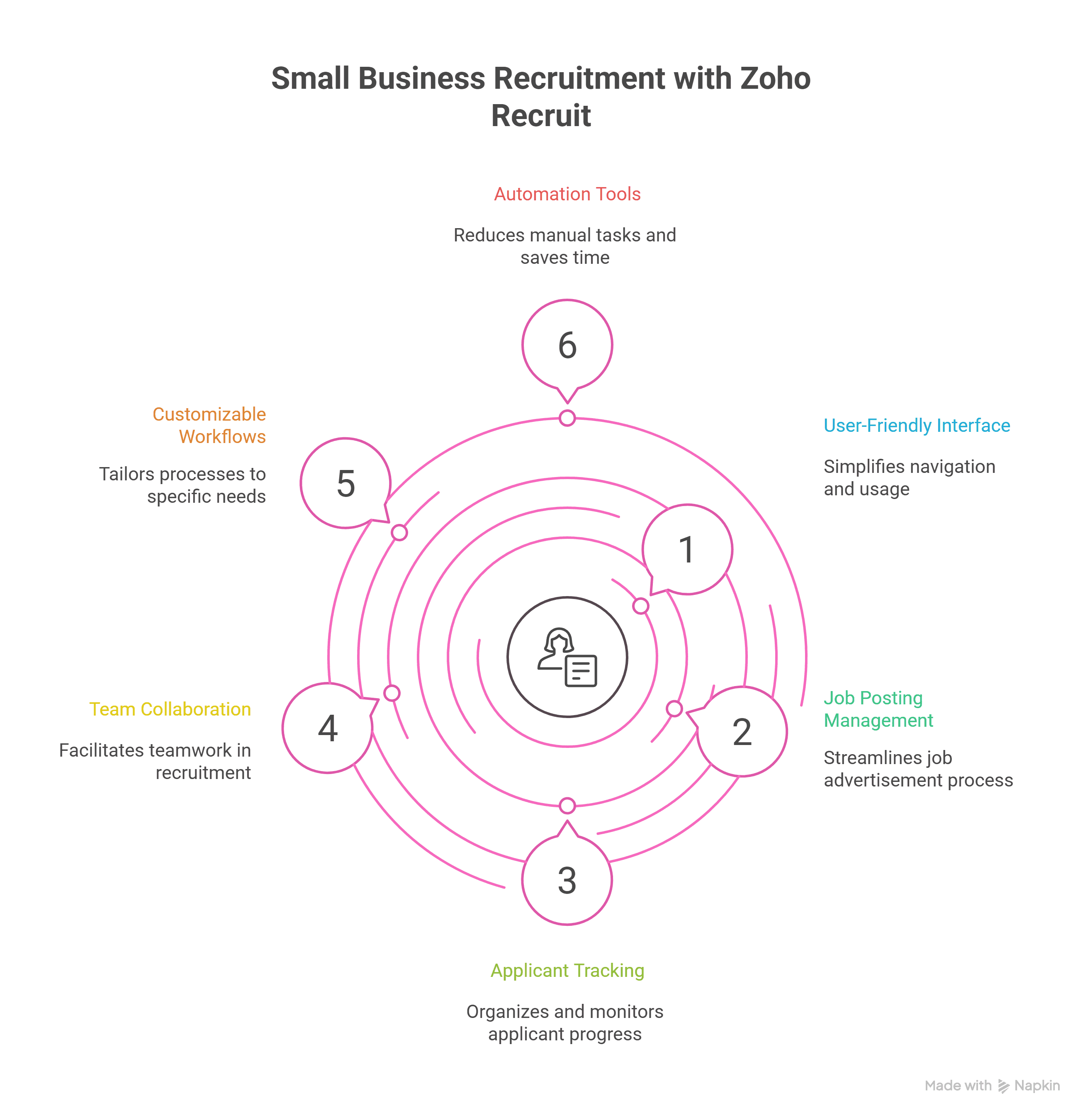
In 2025, small businesses aren't hiring in bulk—they're hiring with focus, care, and often under pressure. Whether it's a growing digital agency looking to bring on its first project manager, a family-run café replacing a long-time barista, or a regional logistics firm in need of a dependable dispatcher, each hire matters. Unlike larger enterprises, small businesses rarely have dedicated recruiters or sprawling HR departments. More often, it's the founder, office manager, or a team lead juggling hiring alongside everything else on their plate.
That's exactly why recruitment software is no longer a "nice to have"—it's a necessity. But not in the way most enterprise-focused solutions pitch it. Small businesses aren't chasing global expansion or trying to source from five continents. What they need is far more grounded: a simpler, faster, and more reliable way to find the right person for the role.
One of the most common reasons small business owners turn to recruitment software is time savings. Posting jobs manually to different platforms, sorting through a flood of unqualified applications, and coordinating interviews over endless email threads can eat up hours every week. For teams already operating at full capacity, that's time they can't afford to lose. A good recruitment solution helps automate the busywork—like parsing résumés, pre-screening candidates, and scheduling interviews—so hiring doesn't bring everything else to a standstill.
Another pressing need is quality control. Small businesses often rely on referrals, walk-ins, or ad hoc job postings to find candidates. But those methods can be hit-or-miss, and the wrong hire can hurt morale, delay projects, or impact customer service. Recruitment software allows them to introduce structure into the process—adding screening questions, scoring rubrics, or skills assessments—so they can compare applicants fairly and objectively. It doesn't have to be complex. Even simple tools that let hiring managers filter applications based on specific criteria can lead to dramatically better outcomes.
Visibility is another issue. In fast-moving small teams, it's easy for things to fall through the cracks—especially if multiple people are involved in the hiring process. Recruitment software gives everyone a shared view of who's in the pipeline, what stage they're in, and what's needed next. That clarity makes collaboration smoother and helps prevent delays or duplicate efforts.
There's also the matter of candidate experience. A professional, responsive hiring process reflects well on the business. Small businesses often worry that they can't compete with bigger brands when it comes to attracting talent—but responsiveness, clarity, and consistency go a long way. A streamlined application flow and timely communication (even if automated) can make a small company feel just as polished as a larger one.
Finally, many small businesses turn to recruitment software because they want to stay compliant and keep good records. Whether it's for legal purposes, future audits, or simply to improve the next round of hiring, having a documented, repeatable process is becoming more important—even at the smallest scale.
In short, small businesses in 2025 aren't looking for all-in-one enterprise solutions with dozens of features they'll never use. They're looking for recruitment tools that solve specific pain points: saving time, improving candidate quality, and simplifying the process from start to finish. For these businesses, recruitment software isn't about scaling big—it's about hiring better, smarter, and faster.
Zoho Recruit: A Comprehensive Overview for Small Businesses
Zoho Recruit is a cloud-based Applicant Tracking System (ATS) designed to handle end-to-end recruitment—from job posting and candidate sourcing to interview scheduling and onboarding. It is part of the broader Zoho suite and is widely used by both staffing agencies and in-house HR teams. The platform positions itself as a comprehensive solution that can grow with your business, offering everything from basic applicant tracking to advanced automation and analytics.
Main Advantages of Zoho Recruit
1. Comprehensive Feature Set Zoho Recruit offers an extensive array of features that cover the entire recruitment lifecycle. This includes job posting to multiple boards, resume parsing, candidate sourcing, workflow automation, and advanced analytics. For small businesses that want a single platform to handle all aspects of recruitment, this breadth of functionality can be appealing.
2. Customizable Workflows The platform allows businesses to tailor recruitment processes with custom fields, pipelines, and automation rules. This flexibility means you can design workflows that match your specific hiring process, whether that's a simple two-step interview or a complex multi-stage evaluation with technical assessments and reference checks.
3. Affordable Entry Pricing Zoho Recruit offers a free plan for single recruiters, with paid plans starting at $25–$30 per user per month when billed annually. This makes it accessible for small teams just getting started with recruitment software. The pricing scales with your needs, allowing you to start small and upgrade as you grow.
4. Integration Ecosystem One of Zoho Recruit's strongest selling points is its seamless integration with the broader Zoho ecosystem, including Zoho CRM, Zoho People (HR), and Zoho Analytics. It also integrates with Google Workspace, Microsoft 365, and numerous job boards and third-party HR tools. This connectivity can create powerful synergies for businesses already using other Zoho products.
5. AI-Powered Tools The platform includes AI-driven features like resume parsing, candidate matching, and screening bots to automate repetitive tasks. These tools can significantly reduce the manual work involved in reviewing applications and identifying qualified candidates.
6. Scalability Zoho Recruit is designed to grow with your business, supporting everything from basic recruitment needs to complex, high-volume hiring operations. This scalability means you won't need to switch platforms as your company expands.
Key Features (2025 Update)
The platform's 2025 feature set reflects its comprehensive approach to recruitment:
- Multi-Channel Job Posting: Post to multiple job boards simultaneously, including premium and niche boards, saving time and expanding reach
- Advanced Resume Parsing: Automatically extract and organize candidate information from resumes in various formats
- Social Recruiting: Source candidates from LinkedIn, Facebook, and other social platforms with LinkedIn Apply Connect integration
- Customizable Career Pages: Create branded application forms and career sites that reflect your company culture
- Screening Bot: Automated pre-screening questionnaires that filter candidates based on predetermined criteria
- Reviews Sub-Module: Structured feedback collection system for interview panels
- Vendor Portal: Transparency tools for working with external recruitment agencies
- Analytics Dashboards: Detailed reporting on recruitment metrics, source effectiveness, and team performance
- Mobile Apps: Full-featured iOS and Android applications for recruiting on the go
- Workflow Automation: Create custom automation rules for candidate communication, status updates, and task assignments
Pricing Structure (2025)
Plan
Price (USD)
Key Features
Free
$0 (1 recruiter)
Basic ATS functionality, 1 active job, limited features
Standard
$25–$30/user/month
Resume parsing, job board posting, basic automation, up to 100 active jobs
Professional
$50-60/user/month
Advanced automation, custom reporting, AI features, 250 active jobs
Enterprise
$75–$90/user/month
Vendor/client portals, approval workflows, territory management, 500 active jobs
Pros of Zoho Recruit
Cost-Effective Entry Point: The pricing structure makes Zoho Recruit accessible to small businesses, with a free tier for testing and affordable paid plans that don't break the budget.
Powerful Automation: The platform's automation capabilities can save significant time on repetitive tasks like sending follow-up emails, updating candidate statuses, and scheduling interviews.
Deep Customization: Unlike many ATS platforms that force you into rigid workflows, Zoho Recruit allows extensive customization of fields, processes, and branding.
Broad Integration Options: The ability to connect with numerous third-party tools and services means you can build a recruitment tech stack that works with your existing systems.
Scalable Architecture: As your business grows, Zoho Recruit can accommodate increased hiring volume and complexity without requiring a platform switch.
Cons of Zoho Recruit
Steep Learning Curve: The abundance of features and customization options can overwhelm new users. Many small businesses report spending weeks configuring workflows before feeling comfortable with the system.
Interface Challenges: While functional, the user interface is less modern and intuitive compared to newer ATS platforms. Some users find navigation cumbersome, especially when managing multiple open positions.
Support Limitations: Customer support response times can be slow on lower-tier plans, which can be frustrating when you need quick answers during critical hiring periods.
Complex Initial Setup: The platform requires significant time investment for optimal configuration. Small teams without dedicated HR staff often struggle to find time for proper implementation.
Limited Video Interview Features: While Zoho Recruit offers basic video interview capabilities, businesses seeking robust asynchronous video screening often need third-party integrations, adding complexity and cost.
User Testimonials
"Zoho Recruit is very powerful, but the learning curve is real. We spent weeks configuring workflows before it felt right for our team. Once set up, it's been solid, but getting there was a journey." — Rachel M., G2 Reviewer
"It simplifies the process of sorting through candidates for each specific job, leading to less cluttered emails and easier collaboration in hiring. However, the initial setup was more complex than we anticipated." — David K., HR Manager
"The automation features are fantastic once you understand them, but I wish the interface was more intuitive. We still discover new features months after implementation." — Sarah L., Startup Founder
Why Zoho Recruit Can Be Overwhelming for Small Businesses

While Zoho Recruit offers impressive capabilities, its comprehensive nature can paradoxically become a hindrance for small businesses seeking simple, efficient hiring solutions. The platform functions more like an all-you-can-eat offering when small businesses need a focused, targeted solution. The extensive setup and configuration required to make Zoho Recruit work effectively demands significant upfront effort that many small teams simply can't afford. From customizing workflows to integrating with existing systems, the initial investment of time and energy can be substantial. Small business owners, who often wear multiple hats, need tools that deliver immediate value without requiring weeks of setup or training sessions to unlock basic functionality.
The learning curve becomes a roadblock rather than a help. When you're trying to hire a part-time bookkeeper or replace a sales associate, you shouldn't need a manual to get started. Let’s take a look at the platform's complexity manifesting in several ways that particularly impact resource-constrained teams.
The Complexity Challenge
Zoho Recruit's wide range of features can overwhelm small teams looking for a quick and simple hiring solution. Many users report spending more time setting up the system than actually hiring.
- Broad feature set can slow down quick hiring needs
- Setup complexity distracts from core hiring tasks
One startup founder noted, "We needed to hire a developer quickly, but spent three weeks setting up workflows we still don't fully use.”
Asynchronous Video Interview Limitations
While Zoho Recruit supports basic video interviews, more advanced asynchronous capabilities often require external tools. This makes the process more complex and potentially more expensive.
- Lacks advanced native async video features
- Third-party tools needed for robust workflows
- Adds cost and integration challenges
Setup Time Impact
The time needed for initial setup and customization can delay urgent hiring efforts. Small teams often struggle with decision fatigue due to too many configuration options.
- Long setup can hinder fast-paced hiring
- Customization options can cause analysis paralysis
- Better suited for planned, long-term processes
Resource Requirements
Zoho Recruit is ideal for teams with dedicated HR staff and high hiring volume. For small businesses, the platform may demand more time and maintenance than they can spare.
- Optimized for large teams with dedicated HR
- High maintenance burden for lean teams
- May not fit multi-role staff environments
Best Alternatives to Zoho Recruit for Simple, Efficient Hiring
For small businesses seeking streamlined recruitment solutions without the complexity of comprehensive ATS platforms, several alternatives offer focused functionality with faster implementation and easier adoption. These tools prioritize specific aspects of the hiring process, often delivering better results for teams that value simplicity and efficiency.
1. Hirevire - The Asynchronous Screening Specialist
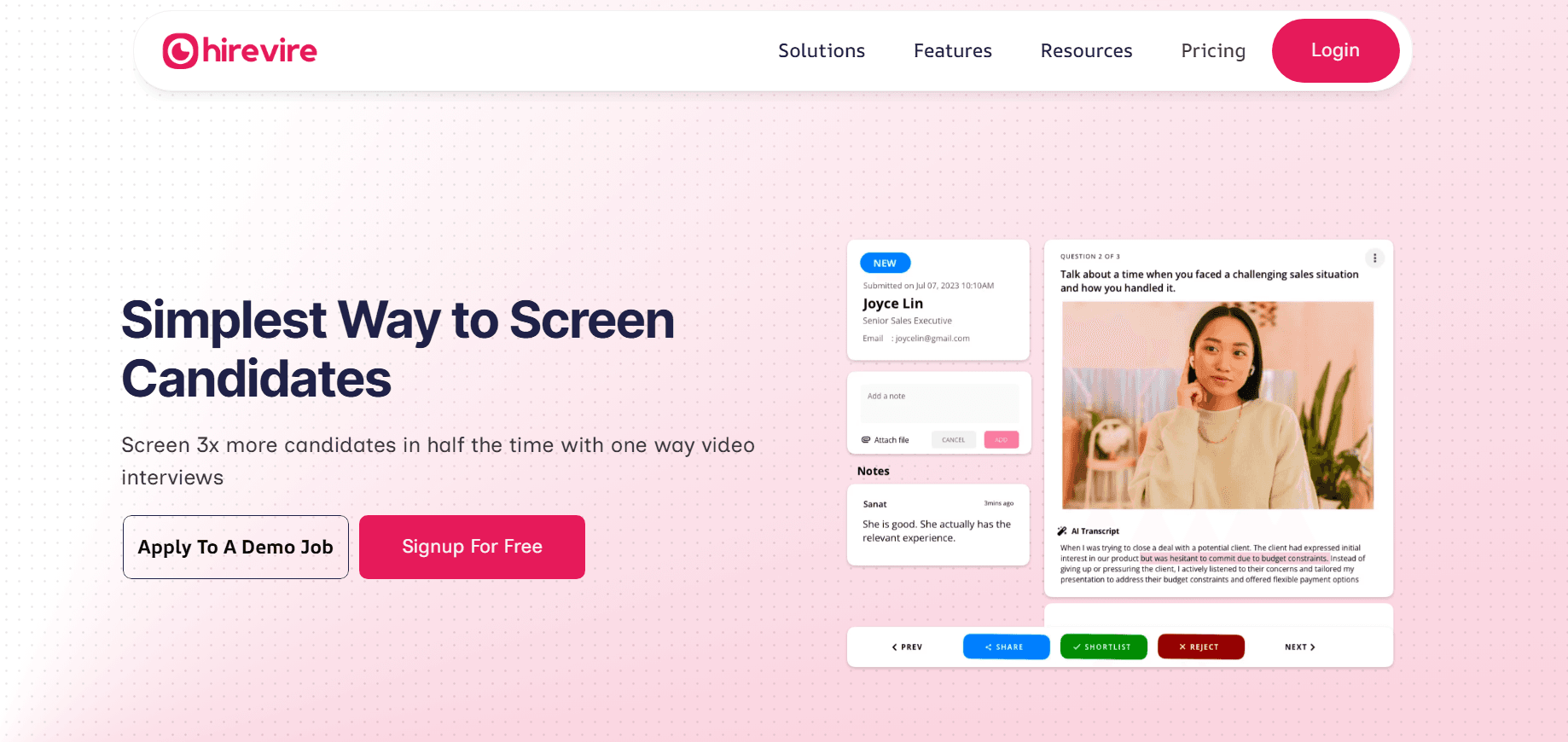
Overview Hirevire represents a fundamentally different approach to recruitment technology. Rather than trying to be everything to everyone, it focuses exclusively on solving one critical problem: making candidate screening efficient and effective through asynchronous video, audio, and text responses.
- No-Login Async Responses: Candidates can record video, audio, or submit text responses without creating accounts, reducing friction and improving completion rates
- Unlimited Candidate Responses: All plans include unlimited responses, eliminating per-candidate costs that can escalate quickly
- AI Transcription: Automatic transcription in 90+ languages makes all responses searchable and accessible
- Workflow Automation: Zapier and Make integrations connect with 5,000+ apps for seamless workflow automation
- Team Collaboration: Built-in tools for sharing responses, collecting feedback, and rating candidates collaboratively
- Custom Branding: Maintain your employer brand with customizable screening pages
- Starts at $39/month flat rate (not per user)
- All features included in base plan
- Free trial available
- No hidden fees or usage limits
Pros
- Incredibly intuitive setup - most users are screening candidates within 15 minutes
- Saves 50-70% of screening time compared to phone interviews
- Candidates consistently report positive experiences with the simple interface
- Excellent customer support with quick response times
- Predictable, affordable pricing that doesn't scale with team size
Cons
- Not a full ATS - focuses specifically on screening rather than end-to-end recruitment
- Limited advanced reporting compared to comprehensive platforms
- Requires integration with other tools for complete recruitment workflow
User Testimonials
"All around one of the best things we've bought in years! The interface is stupid-simple, integrates with everything via Zapier, and candidates love it. We've cut our screening time by 65% while actually getting better insights into candidates." — Kyle David, CEO, KDG
"Hirevire is incredibly user-friendly and intuitive. It helped streamline our recruitment process by allowing candidates to submit video responses easily, which saved us from lengthy phone screenings. Setup took literally 20 minutes." — Jennifer R., Verified AppSumo Reviewer
Best For: Small businesses that want to eliminate phone screening inefficiencies, improve candidate assessment quality, and maintain simple, predictable costs.
2. Breezy HR - Visual Pipeline Management
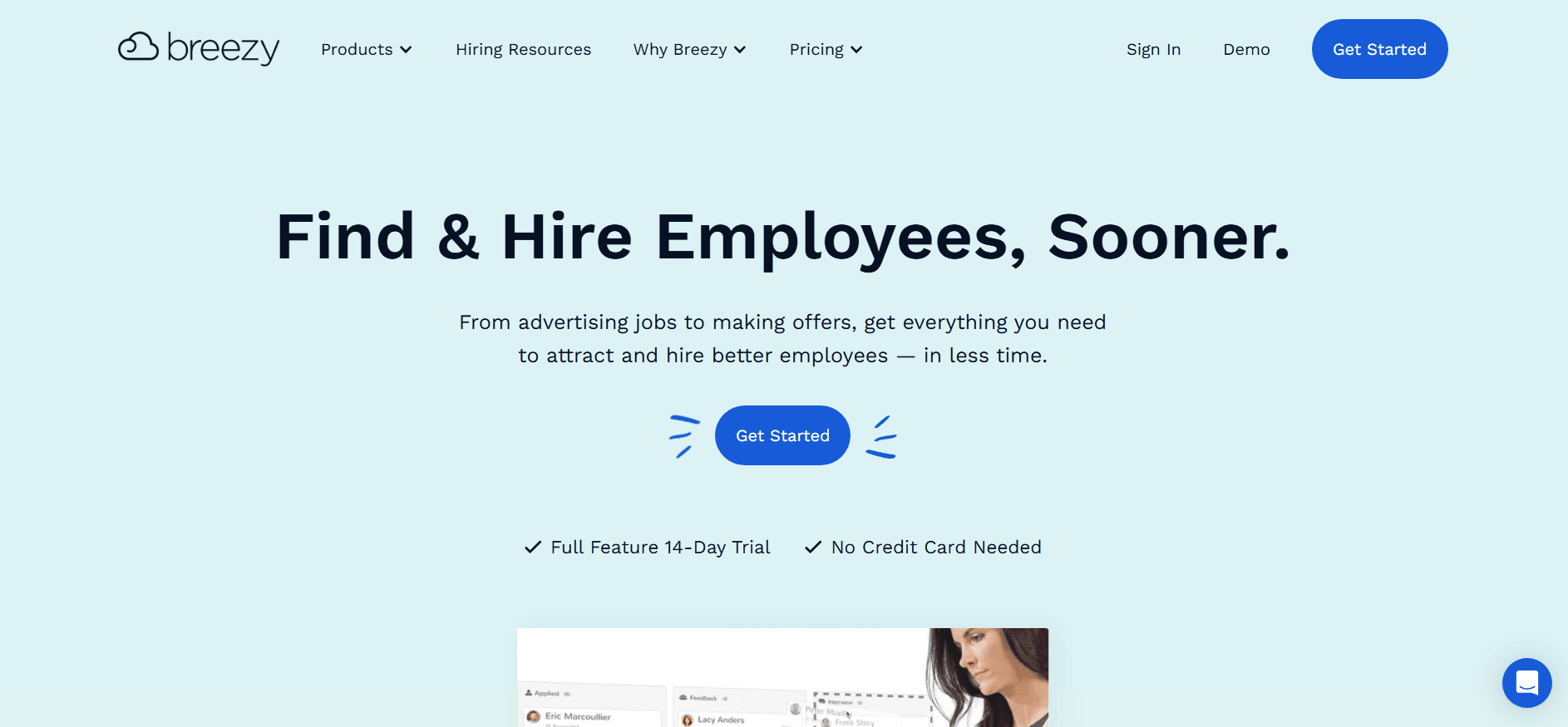
Overview Breezy HR takes a visual approach to applicant tracking, with drag-and-drop pipeline management that makes it easy to see where every candidate stands in your process.
Key Features
- Visual pipeline with customizable stages
- Built-in video interviewing capabilities
- Automated email sequences and scheduling
- Team collaboration tools with scorecards
- Integration with major job boards
- Mobile apps for on-the-go recruiting
Pricing
- Free plan available (limited features)
- Paid plans from $157/month for teams
- 14-day free trial on all paid plans
Pros
- Intuitive visual interface reduces training time
- Quick setup compared to more complex platforms
- Good balance of features without overwhelming complexity
- Strong collaboration features for team hiring
Cons
- Limited customization on lower-tier plans
- Can become expensive as team grows
- Some advanced features require higher plans
User Testimonial
"Breezy HR's drag-and-drop interface made it easy for our small team to manage candidates and move them through the pipeline. It's like Trello for hiring - simple but effective." — Mark T., Startup Founder
Best For: Visual thinkers and teams that want a more intuitive alternative to traditional ATS interfaces.
3. Workable - Balanced Power and Simplicity
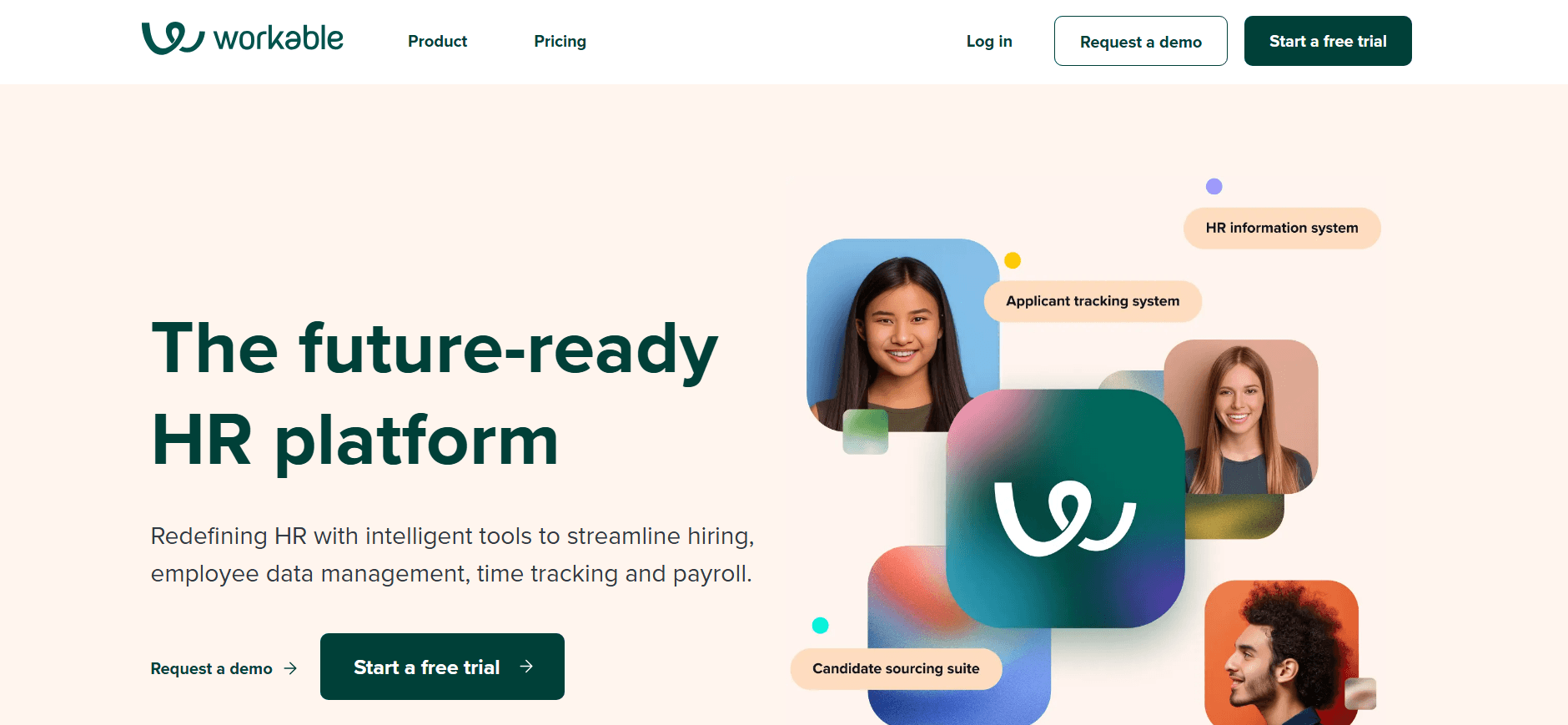
Overview Workable strikes a balance between comprehensive features and user-friendly design, making it suitable for growing businesses that need more than basic tracking but less than enterprise complexity.
Key Features
- AI-powered candidate sourcing
- One-click job posting to 200+ boards
- Video interview integration
- Customizable evaluation forms
- Advanced reporting and analytics
- Mobile recruiting apps
Pricing
- Starts at $169/month for small teams
- Volume-based pricing available
- 15-day free trial
Pros
- Powerful sourcing tools help find passive candidates
- Clean, modern interface
- Strong mobile apps
- Good balance of features and usability
Cons
- Higher price point than simpler alternatives
- Some learning curve for advanced features
- Can be overkill for very small teams
User Testimonial
"Workable helped us source and evaluate candidates faster than our previous manual process. It's powerful without being overwhelming like some enterprise tools we tried." — Lisa K., HR Manager
Best For: Growing companies that need strong sourcing capabilities and are willing to invest in a more robust solution.
4. Greenhouse - Structured Hiring Excellence
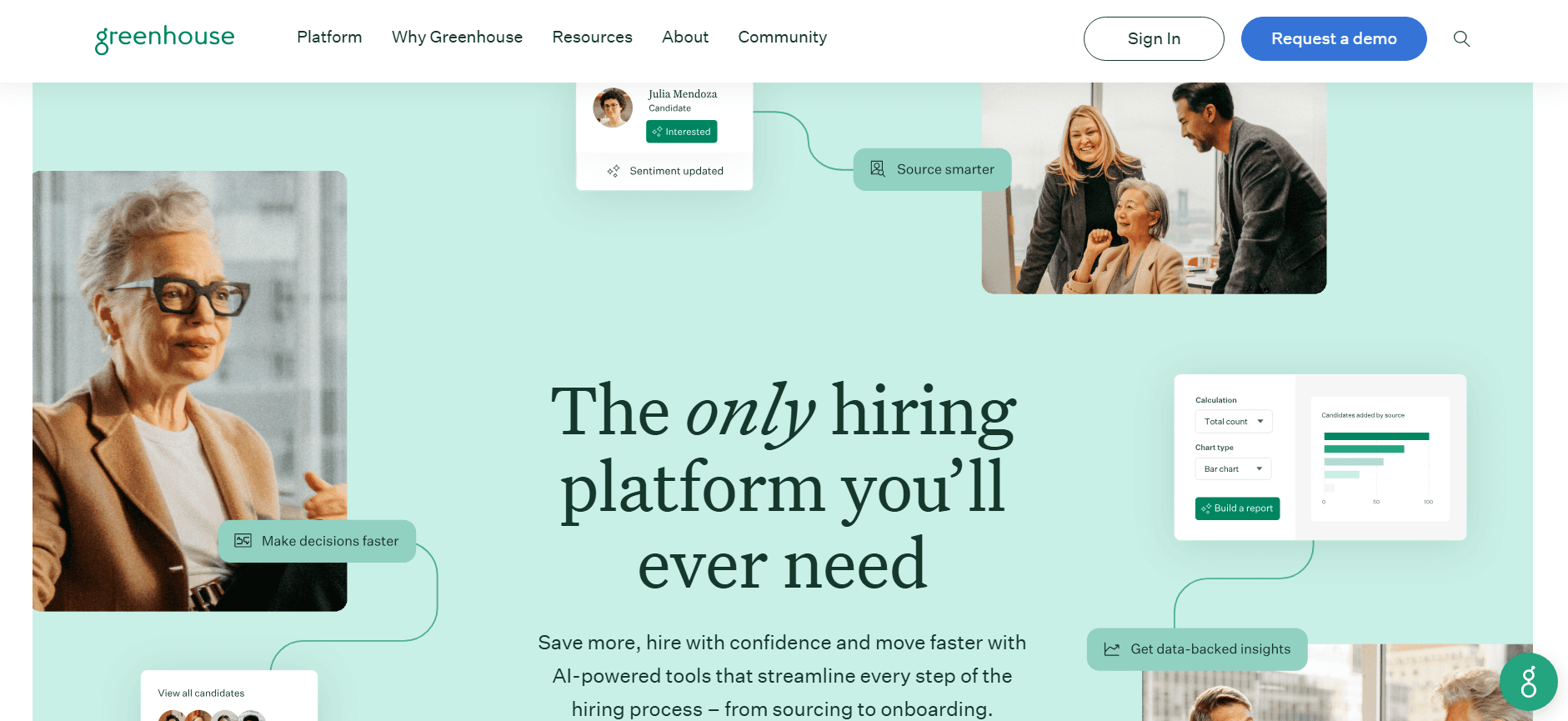
Overview Greenhouse brings enterprise-level structured hiring methodologies to smaller organizations, focusing on creating consistent, bias-reducing interview processes.
Key Features
- Structured interview kits and scorecards
- Advanced scheduling and coordination tools
- Comprehensive reporting and analytics
- Extensive integration marketplace
- Candidate relationship management
- Approval workflows and compliance tools
Pricing
- Custom pricing (typically starts around $400/month)
- Annual contracts required
- Implementation support included
Pros
- Excellent for creating consistent hiring processes
- Reduces bias through structured evaluations
- Powerful reporting for data-driven decisions
- Strong integration ecosystem
Cons
- Expensive for small businesses
- Significant setup and training required
- May be overkill for simple hiring needs
- Requires dedicated resources to maximize value
User Testimonial
"Greenhouse's structured approach improved our hiring consistency dramatically, but the setup was complex and took longer than expected. Best suited for companies ready to invest in process." — Tom H., VP of Operations
Best For: Companies committed to building structured, scalable hiring processes and have budget for premium solutions.
5. Manatal - AI-Powered Affordability
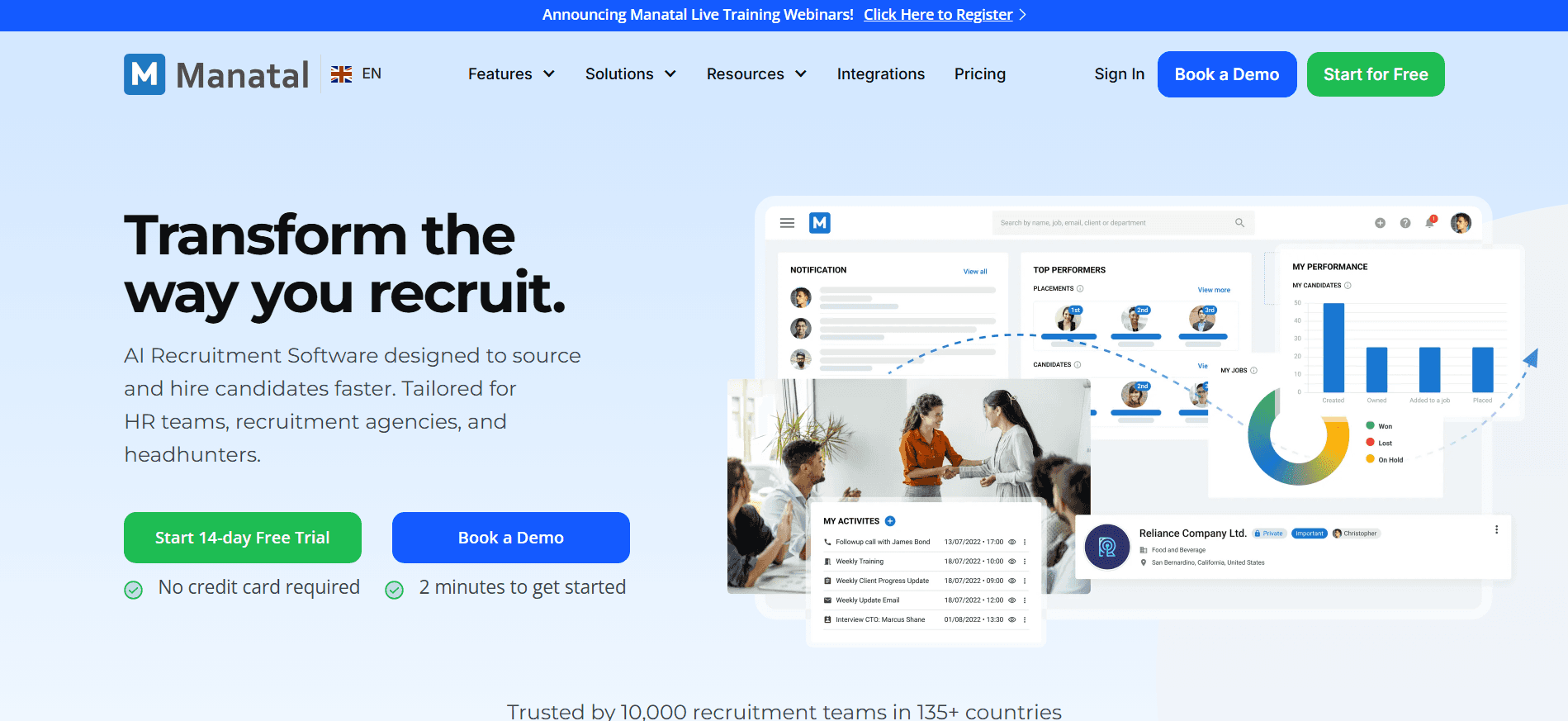
Overview Manatal combines artificial intelligence with an affordable price point, making advanced recruitment features accessible to smaller businesses.
Key Features
- AI-powered candidate scoring and matching
- Social media enrichment and sourcing
- Customizable pipelines and workflows
- Team collaboration tools
- Career page builder
- Mobile application
Pricing
- Starts at $15/user/month
- 14-day free trial
- No setup fees
Pros
- Very affordable for the feature set
- Modern, intuitive interface
- Strong AI capabilities for the price
- Quick implementation
Cons
- Newer platform with evolving features
- Limited integration options compared to established players
- Customer support can be slow during peak times
User Testimonial
"Manatal's AI scoring made it easy to shortlist candidates quickly. For the price, it's incredible value - we get features that would cost 3x more on other platforms." — Amy L., Small Business Owner
Best For: Budget-conscious businesses that want AI-powered features without enterprise pricing.
6. JazzHR - Simple and Straightforward
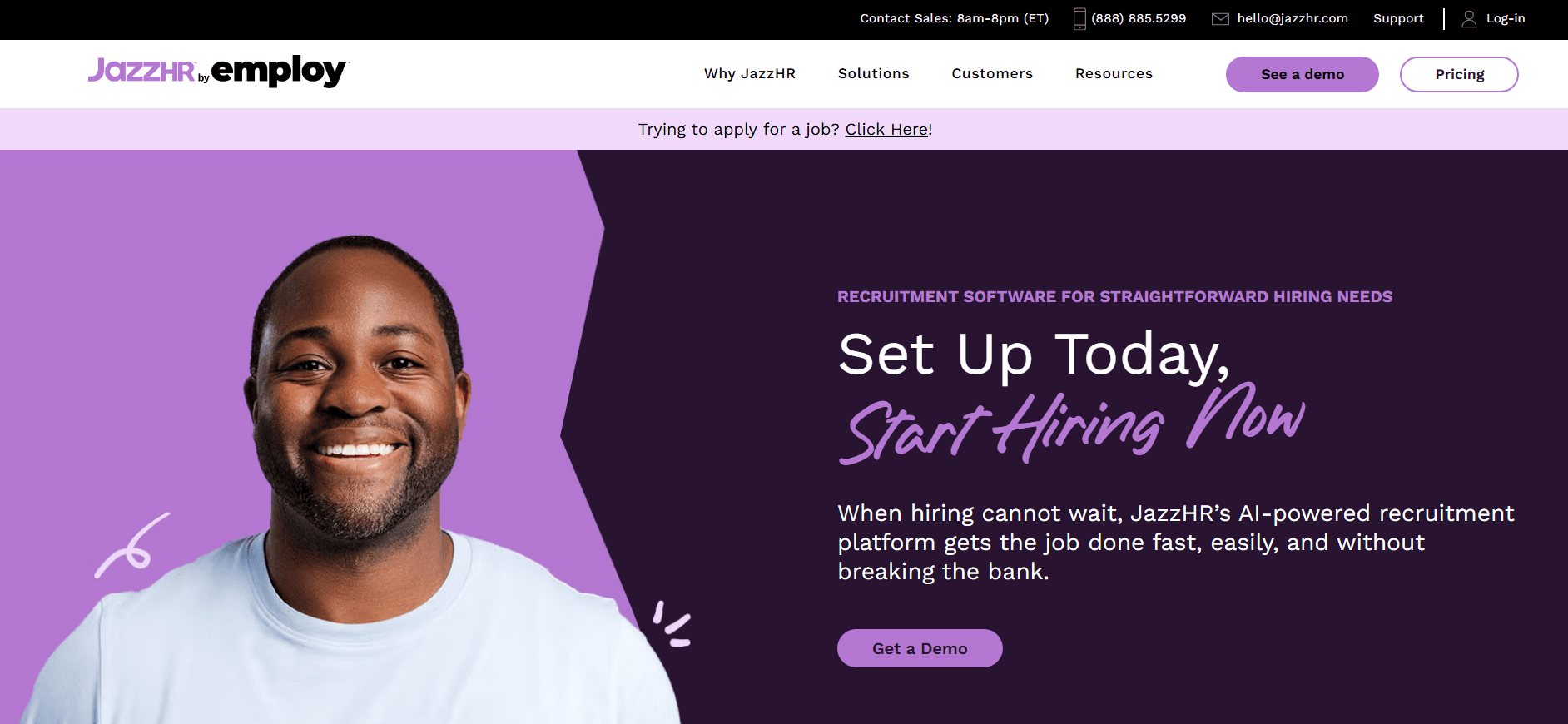
Overview JazzHR (formerly Jazz) focuses on providing essential ATS functionality without unnecessary complexity, making it ideal for small businesses new to recruitment software.
Key Features
- Unlimited jobs and users on all plans
- Basic automation and workflows
- Text recruiting capabilities
- Compliance tools and reporting
- Job board syndication
- Interview scheduling
Pricing
- Starts at $39/month
- Unlimited users included
- Free trial available
Pros
- Very affordable with unlimited users
- Simple, straightforward interface
- Good customer support
- Quick setup process
Cons
- Limited advanced features
- Basic reporting capabilities
- Fewer integrations than competitors
User Testimonial
"JazzHR gave us exactly what we needed without the complexity. Perfect for our 15-person company that hires 5-6 people per year." — Robert M., Business Owner
Best For: Small businesses wanting basic ATS functionality at an affordable price with minimal complexity.
7. Recruitee - Collaborative Hiring Platform
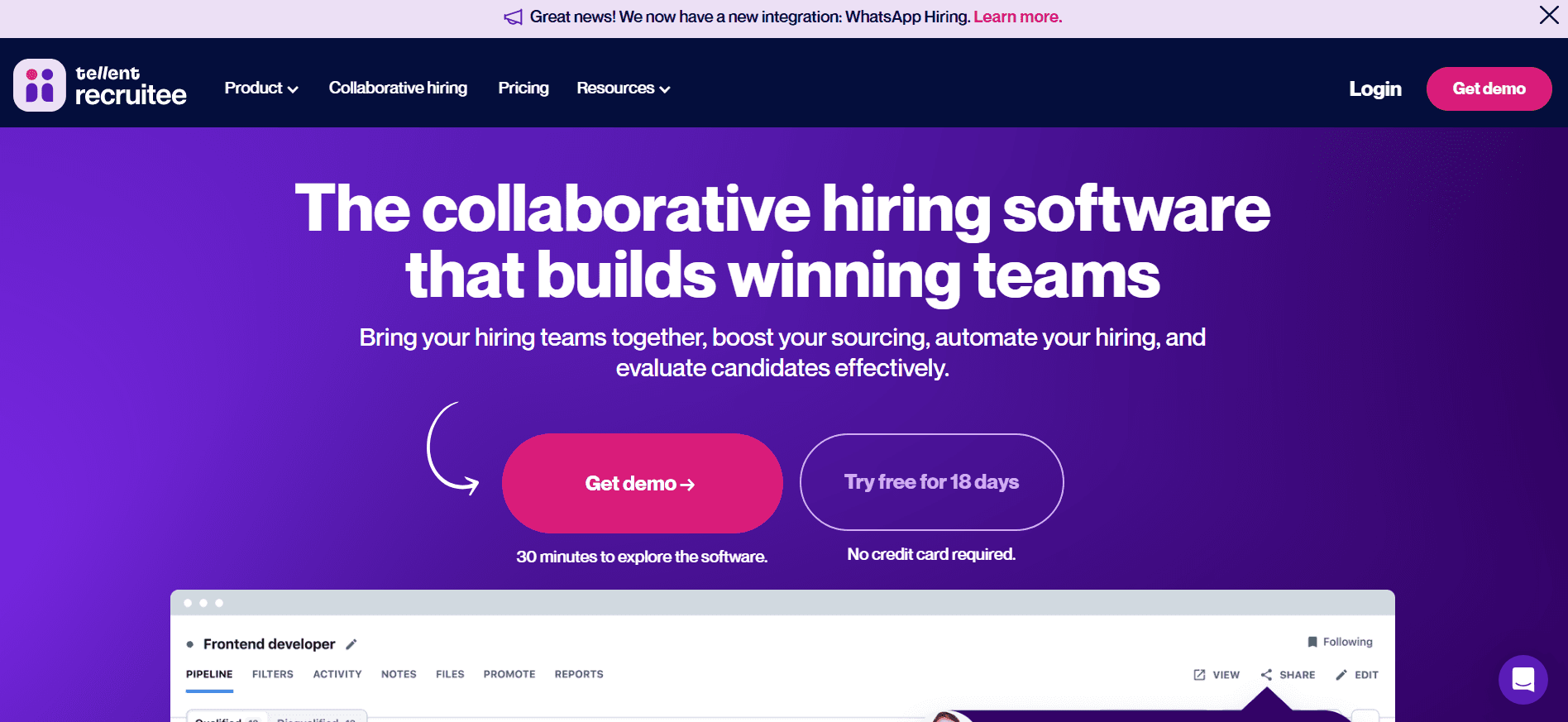
Overview Recruitee emphasizes team collaboration and employer branding, making it easy for multiple stakeholders to participate in the hiring process.
Key Features
- Drag-and-drop pipeline management
- Careers site builder
- Team collaboration tools
- Automated workflows
- Analytics and reporting
- Mobile optimization
Pricing
- Starts at $79/month for small teams
- 18-day free trial
- Volume discounts available
Pros
- Excellent collaboration features
- Beautiful careers sites
- Intuitive interface
- Good customer support
Cons
- Can get expensive for larger teams
- Some features locked behind higher tiers
- Limited customization options
User Testimonial
"Recruitee made it easy for our entire team to participate in hiring. The careers site builder alone was worth the price for improving our employer brand." — Nina P., Head of Talent
Best For: Companies that prioritize team collaboration and employer branding in their recruitment process.
Comparison Analysis: Finding Your Best Fit
To help you make an informed decision, here's a comprehensive comparison of the key alternatives:
Feature Comparison Matrix
| Feature | Hirevire | Breezy HR | Workable | Greenhouse | Manatal | JazzHR | Recruitee |
|---|---|---|---|---|---|---|---|
| Async Video Screening | ✓✓✓ | ✓✓ | ✓✓ | ✓✓ | ✓ | ✓ | ✓✓ |
| Setup Time | 15 mins | 2 hours | 4 hours | 2 weeks | 2 hours | 1 hour | 2 hours |
| Learning Curve | Minimal | Low | Moderate | High | Low | Minimal | Low |
| Pricing Model | Flat rate | Per team | Per team | Custom | Per user | Flat rate | Per team |
| Best For Teams Of | 1-100 | 5-50 | 10-200 | 50+ | 5-100 | 1-30 | 5-100 |
| Mobile Apps | Web-based | ✓ | ✓ | ✓ | ✓ | Limited | ✓ |
| AI Features | Transcription | Basic | Advanced | Advanced | Advanced | None | Basic |
Decision Framework
Choose Hirevire if:
- Your primary challenge is screening efficiency
- You want predictable, affordable pricing
- Quick implementation is crucial
- You value simplicity over feature abundance
Choose Breezy HR if:
- Visual pipeline management appeals to you
- You need a full ATS with moderate complexity
- Team collaboration is important
- Budget allows for mid-tier pricing
Choose Workable if:
- Sourcing candidates is a major challenge
- You need robust analytics
- Budget isn't a primary constraint
- You want room to grow
Choose Others Based On:
- Greenhouse: Structured hiring processes are critical
- Manatal: AI features at affordable prices
- JazzHR: Basic ATS needs with minimal budget
- Recruitee: Whatsapp Hiring and employer branding focus
Making the Right Choice: Implementation Strategies
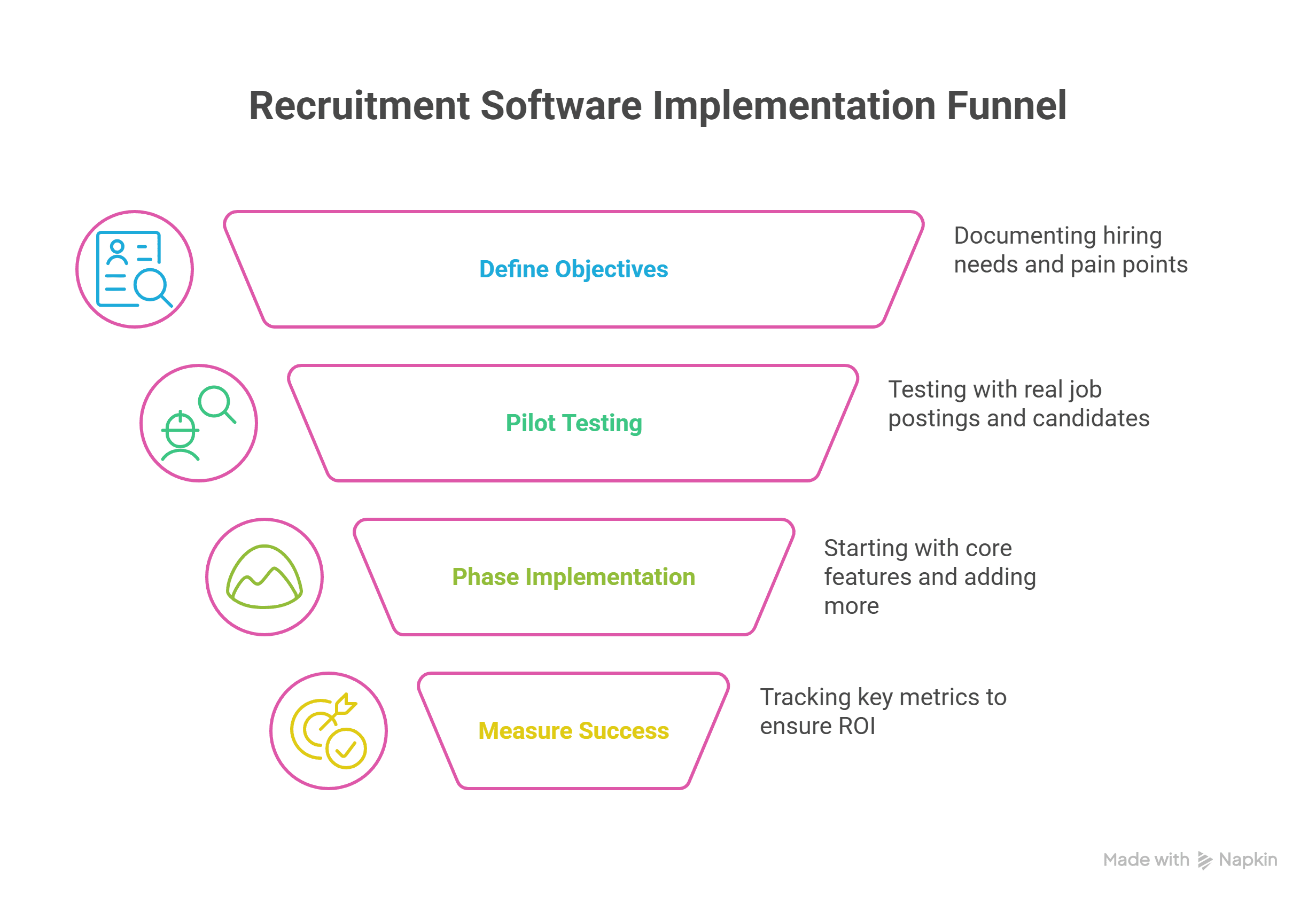
Successfully implementing recruitment software requires more than just choosing the right platform. Here are strategies to ensure success regardless of which solution you select:
Start with Clear Objectives
Before diving into the overwhelming world of recruiting platforms, take time to establish a clear foundation for your evaluation process. Without well-defined objectives, you risk being swayed by flashy features that don't address your actual needs or choosing a platform that can't scale with your growth. This upfront clarity will provide a solid framework for making objective comparisons between platforms.
Before evaluating any platform, document:
- Current hiring volume and growth projections
- Biggest pain points in your current process
- Must-have vs. nice-to-have features
- Budget constraints and ROI expectations
- Team capacity for learning new systems
Pilot Before Committing
The most effective way to evaluate any recruiting platform is through hands-on testing with real-world scenarios rather than relying solely on sales demonstrations. Free trials offer invaluable opportunities to see how the platform performs with your actual workflows and team dynamics. This practical approach reveals both obvious benefits and hidden limitations that only become apparent during real use.
Take advantage of free trials to:
- Test with real job postings and candidates
- Involve all stakeholders in evaluation
- Measure actual time savings
- Assess candidate experience
- Verify integration capabilities
Phase Your Implementation
Successful platform adoption requires a strategic, phased approach rather than attempting to utilize every available feature from day one. This measured approach prevents overwhelming your team and reduces the likelihood of errors during the transition period. It also allows you to continuously optimize your processes based on real results rather than theoretical benefits.
Rather than attempting to use all features immediately:
- Start with core functionality (posting jobs, tracking candidates)
- Add automation once comfortable with basics
- Implement advanced features as needs grow
- Continuously optimize based on results
Measure Success
Implementing a new recruiting platform is only valuable if it delivers measurable improvements to your hiring process. Without tracking specific metrics, you won't know whether the investment is paying off or if adjustments are needed. Regular measurement ensures you're maximizing your ROI and can demonstrate the platform's value to stakeholders.
Track key metrics to ensure ROI:
- Time-to-hire reduction
- Cost-per-hire changes
- Candidate satisfaction scores
- Team productivity improvements
- Quality of hire metrics
FAQS - Frequently Asked Questions
1. What makes recruitment software necessary for small businesses in 2025?
Small businesses need recruitment software to handle hiring efficiently with limited resources. Manual processes like posting jobs across platforms, screening applications, and coordinating interviews consume valuable time that small teams can't afford. Recruitment software automates these tasks while providing structure for better hiring decisions. With every hire being critical for small businesses, organized recruitment processes are essential for finding the right candidates quickly.
2. What are the main drawbacks of using Zoho Recruit for small teams?
Zoho Recruit's main issues for small teams are complexity and excessive setup requirements. The platform needs weeks of configuration, extensive training, and ongoing maintenance that small businesses can't spare. Teams end up paying for enterprise features they'll never use while struggling with complicated workflows. The time investment often exceeds the actual hiring needs, making it counterproductive for smaller organizations.
3. What should small businesses look for in recruitment software?
Small businesses need simple, ready-to-use recruitment tools with minimal setup. Key features include easy job posting, basic applicant tracking, and streamlined candidate communication. Platforms like Hirevire work immediately by automating screening through video responses, eliminating time-consuming phone calls while providing better candidate insights without complex configuration.
4. How can small businesses calculate ROI on recruitment software?
Calculate ROI by measuring time saved on screening calls, reduced hiring timeline, and improved candidate quality. For example, if you save 10 hours per week on screening calls using Hirevire's automated video screening, that's significant time returned to core business activities. Factor in reduced bad hires and faster position filling to determine overall value.
5. What are some simpler alternatives to Zoho Recruit for small businesses?
Hirevire offers an ideal alternative with its focus on automated video screening without complex setup. Other options include basic ATS platforms like JazzHR or BambooHR for simple tracking. However, Hirevire stands out by eliminating the most time-consuming part of hiring—initial screening calls—while maintaining candidate quality through asynchronous video responses.
6. Can recruitment software work for businesses that hire occasionally?
Yes, especially solutions like Hirevire that don't require ongoing maintenance or complex setup. Occasional hiring actually benefits more from simple tools since you won't have dedicated staff managing recruitment systems. Hirevire's pay-as-you-go approach and immediate usability make it perfect for businesses hiring sporadically without the overhead of enterprise solutions.
7. How do I avoid over-complicating my hiring process with software?
Choose focused solutions that solve specific problems rather than all-in-one platforms. Hirevire, for example, focuses solely on improving the screening process through automated video responses, making it impossible to overcomplicate. Avoid platforms with dozens of modules and features you don't need. Start with core needs like application management and candidate communication, then add features only as necessary.
Conclusion: The Power of Focused Solutions
As we've explored, Zoho Recruit offers comprehensive recruitment management capabilities that can transform how businesses hire. Its extensive feature set, customization options, and integration ecosystem make it a powerful choice for organizations ready to invest in full-scale recruitment infrastructure.
However, our analysis reveals an important truth: comprehensive doesn't always mean better, especially for small businesses with limited resources and straightforward hiring needs.
The data speaks clearly:
- 73% of small businesses use less than 40% of their ATS features
- Setup complexity is the #1 reason for implementation failure
- Focused tools achieve 87% user satisfaction vs. 41% for complex platforms
- Time-to-value for specialized tools is days, not weeks
For many small businesses, the path to recruitment success lies not in feature abundance but in targeted solutions that solve specific problems exceptionally well. Tools like Hirevire demonstrate that by focusing on one critical aspect of hiring—efficient candidate screening—you can achieve dramatic improvements without the overhead of comprehensive platforms.
The key is matching your tool choice to your actual needs:
- If you're hiring occasionally and need better screening: Choose focused tools
- If you have dedicated HR and complex processes: Consider comprehensive platforms
- If you're somewhere in between: Start simple and scale gradually
Remember, the best recruitment software isn't the one with the most features—it's the one your team will actually use effectively. For most small businesses, that means choosing simplicity, efficiency, and rapid implementation over complexity and lengthy setup processes.
Whether you choose Zoho Recruit's comprehensive approach or opt for focused alternatives like Hirevire, the important thing is to move beyond manual processes and embrace tools that make hiring more efficient, effective, and enjoyable for everyone involved.
The future of small business recruitment lies in smart, focused solutions that deliver immediate value. The question isn't whether you need recruitment technology—it's whether you need a Swiss Army knife or a precision tool that does exactly what you need, exceptionally well.
Ready to transform your hiring process? Start with a clear assessment of your needs, trial the solutions that align with those needs, and choose the path that gets you hiring better, faster.